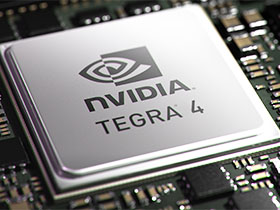64-bit Nvidia Tegra 6 "Parker" Chip May Arrive in 2014
Devices with a 64-bit Tegra 6 could launch before the end of 2014.

Thanks to Apple and its A7 chip, the race to bring another 64-bit SoC to the market is on, and it seems to be between Samsung, Qualcomm, Intel and Nvidia. Samsung has already acknowledged that it's working on a 64-bit Exynos, and Qualcomm has reportedly been tight-lipped about its 64-bit plans. Intel is already a given, so that leaves Nvidia, which may be forced to accelerate its schedule to keep from lagging behind.
A report from ExtremeTech argues that Nvidia may actually release its "Parker" chip, AKA Tegra 6, in 2014 rather than in 2015. This theory is based on Nvidia reportedly having licensed and started working with ARMv8 back in 2010 or early 2011. If that is indeed the case, then the company may have samples of the 64-bit "Denver" CPU cores ready in early 2014.
Currently Nvidia is expected to churn out the Tegra 5 "Logan" chip in early 2014, packed with CPU cores based on ARM Cortex-A15, Kepler GPU cores, CUDA support and OpenGL 4.3 support. With samples of the Denver cores arriving in the same timeframe, Nvidia may end up with Tegra 6 chips in phones and tablets by the end of the year, cutting the Tegra 5's lifespan a bit short.
Nvidia introduced the Tegra 4 chip during CES 2013 back in January, and is just now starting to work its way into devices such as Microsoft's upcoming Surface 2, the M.O.J.O. Android console, HP's SlateBook x2 and Slate21, and more. The chip even appears in Nvidia's own Shield Android handheld console and the Tegra Note tablet reference design.
AnandTech points out that with the current Tegra 4 and in past ARM-based chips, Nvidia has used CPU designs licensed directly from ARM Holdings, which are then paired with Nvidia's own custom low-power GeForce GPU cores. Apple and Qualcomm design their own CPU cores based on the ARM instruction set, allowing them to produce custom chips. For instance, Qualcomm's chips can dynamically change clock speed of each core based on system load, whereas Nvidia had to throw in a fifth "companion" core to handle low-power tasks.
However in the case of Tegra 6, Nvidia is reportedly creating custom "Denver" 64-bit cores. Forbes seems to agree with ExtremeTech's argument, reporting that Nvidia just may well power the first 64-bit Android devices next year. The report also points to the team, packed full of CPU "jockeys" from Intel, AMD, HP, Sun and Transmeta. They have tons of experience in superscalar, OoO (out of order) execution design, micro-code, VLIW, hyper-threading, and multi-core. The team doesn't promise success, but does provide an opportunity to put Nvidia in the same "custom" group shared by Apple and Qualcomm.
The big race here, it seems, is to get the first 64-bit chip into an Android device. The only immediate benefit is eliminating the 32-bit limit of 4 GB of RAM, allowing for up to 16 exabytes of memory. What else 64-bit currently brings to the table has been widely debatable since Apple's introduction of the A7 chip. But the move is inevitable, even necessary if these chip makers plan to do battle in the enterprise arena.
Get Tom's Hardware's best news and in-depth reviews, straight to your inbox.
Follow us @tomshardware, on Facebook and on Google+.
-
deltatux Ummm, Intel's Bay Trail SoCs are 64-bit ready... article seems to forget that little nugget and we're starting to see Intel Bay Trail SoCs beginning this month in devices like the Dell Venue 8 Pro and 11 Pro.Reply -
ragenalien Could intel make bay trail 64 bit? Easily. They know that it's a marketing gimmick. Technically speaking they're bay trail chips for the server market already have that feature "turned on".Reply -
Hans Schenk lol i bet in a couple of years mobile phones will be more powerful then next gen consolesReply -
JOSHSKORN Somebody needs to force Intel to move a bit faster. We should already have 8-core CPUs by now in mainstream CPUs.Reply -
ojas @ragealien: Bay Trail supports 64 bit instructions already (since it's a feature of Silvermont) but only Windows 8 x86 supports connected standby, hence it isn't used. Android doesn't have any official x64 builds either (afaik) so it's not possible on that front either.Reply -
jasonpwns People think 64 bit is a gimmick? Tablets are eventually going to want over 4GB of memory.Reply -
antilycus Welcome to the original 3D acceleration race all over again, this time developers aren't going to jump an any bandwagon until things settle down. Nvidia is going to burn its bridges and if things are expect correctly, someone else will just copy their technology (cough AMD) and make a name for itself in the mobile GPU market.Reply -
antilycus The ONLY need for 64bit computing in the mobile sector is bad memory management on java's part. Android is java ontop of linux. iOS and everything Apple has always been extremely poor at memory management. Instead of FIXING the problem, everyone's idea is to increase the ram. Linux on 1GB of ram can run better than the same hardware specs on a Windows 7 / 8 machine with 12 GB of ram. Whats the real problem? ...THE OPERATING SYSTEM KERNEL. Linux owns memory management, the rest just pretend they know how to optimize. I say this as someone who actually knows, not just a fanboy.Reply